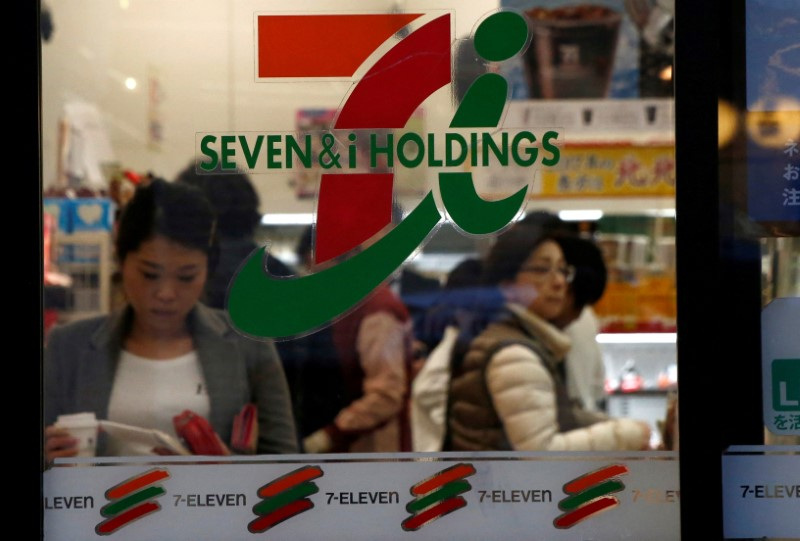By David Dolan and Rocky Swift
TOKYO (Reuters) - A rise in shareholder activism in Japan is poised to fuel a new wave of management buyouts by founding families, after the battle for 7-Eleven's parent company prompted a $58 billion takeover offer from the Ito dynasty that built the retail giant.
Seven & i Holdings Vice President Junro Ito swooped in last month with an offer to take private the company founded by his late father in what would be the largest ever management buyout (MBO).
Ito's "white knight" bid appears designed to keep Seven & i away from Canada's Alimentation Couche-Tard, which announced a takeover proposal in August. The Circle K owner raised its bid for Seven & i by about 22% to $47 billion in October after its initial offer was rejected.
The scramble for Seven & i gives a taste of how deals are likely to develop in the years to come, industry experts say, as changes in Japan Inc's corporate governance standards make delisting an increasingly compelling option.
A few years ago, companies could ignore unsolicited offers because they were protected by cross shareholdings - the practice of holding stakes in business partners to cement relationships.
But those holdings are now being sold off under a government push for better governance. Companies have also been told they should give serious consideration to credible buyout offers.
"Managers can no longer ignore shareholders as they could in the past. Cross shareholdings are being unwound all the time," said Travis Lundy of Quiddity Advisors who publishes on the Smartkarma platform.
"MBOs are going to be more common," Lundy said, adding the government's guidelines on giving consideration to buyout offers were "a game changer".
ALL IN THE FAMILY
Last year, Japanese deals where management took stakes, including MBOs, totalled $7.1 billion, the most in at least 36 years, LSEG data showed. The value has fallen from that peak this year, but remains at $1.7 billion.
Among recent deals, educational publisher and nursing home operator Benesse Holdings was taken private in an MBO by the founding Fukutake family and Swedish private equity firm EQT (ST:EQTAB). Drugmaker Taisho Pharmaceutical (TADAWUL:2070) was bought out by a member of its founding Uehara family.
MBOs are becoming an attractive option because the governance overhaul has created bigger burdens for listed firms, while being a public company no longer confers the status it once did, said Ulrike Schaede, a professor of Japanese business at the University of California San Diego.
Schaede gives the example of Germany, where MBOs have become a "new defence" against shareholder activism, adding that Japan could start to see a similar trend, especially given private equity's appetite for deals in the country.
Japan is hardly the only place where founding families hold stakes and sway after the founder dies - and Seven & i not the only global retailer in that position.
The family of Walmart (NYSE:WMT) founder Sam Walton holds 45.5% of the U.S. retailer, while the largest shareholders of Sweden's H&M (ST:HMb) are Stefan Persson, son of the founder, and his family.
SMALL STAKES
But Japan stands out because families are able to wield considerable power despite holding small stakes.
Ito-Kogyo, the company tied to Junro Ito that is bidding for Seven & i, holds only about 8.2% of the retailer.
Historically, family control of businesses in Japan has been "more persistent than the very low equity ownership by founding families would indicate", researchers from the University of Copenhagen, the University of Alberta School of Business and elsewhere wrote in a 2021 Journal of Financial Economics paper.
Some 10% to 30% of listed Japanese companies from the 1960s to 2010 were managed by founding family heirs with "little ownership to report", Morten Bennedsen, Vikas Mehrotra and their co-authors found.
They pointed to examples such as the Toyoda family at Toyota Motor (NYSE:TM) Corp, the Suzukis of Suzuki Motor Corp and the Kashios at Casio Computer. Such families were able to retain control via what the researchers called "soft family assets", including their name and reputation.
"We certainly expect that the trend is continuing, there is no sign it is changing," Bennedsen told Reuters.
One Seven & i investor recalled attending a meeting with company executives including Junro Ito, who sat silent throughout. The extent to which the Ito family wielded influence and power within the company was "something of a mystery", said the investor, who asked not to be named due to company policy.
A Seven & i spokesperson declined to comment.
At many companies the founder's legacy still looms large. In recent years Seven & i resisted calls from foreign investors to hive off its Ito-Yokado supermarkets' business out of respect for founder Masatoshi Ito's vision, according to veteran Japan retail analyst Michael Causton.
"The Ito legacy, as in many Japanese companies with a charismatic founder, is an unwritten red line in the company known to all executives," Causton said, adding that amounted to preserving Seven & i as a conglomerate spanning supermarkets, general merchandise and convenience stores.
It remains to be seen whether the Ito family will manage to raise the funds needed for the deal - although it appears that domestic banks are lining up with them.

What is clear is that more such deals are likely to happen, something investors welcome.
"If the founding families in Japan really want to control and influence their companies, then they shouldn't be listed and instead taken private," the Seven & i investor said.